美国总统林肯写给其兄弟的一封信
林肯曾在朋友的信中谈到幼年的一段经历作文
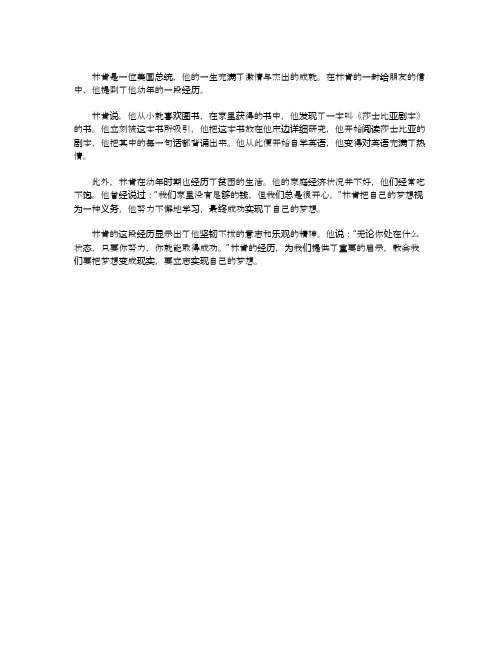
林肯是一位美国总统,他的一生充满了激情与杰出的成就。
在林肯的一封给朋友的信中,他提到了他幼年的一段经历。
林肯说,他从小就喜欢图书,在家里获得的书中,他发现了一本叫《莎士比亚剧本》的书。
他立刻被这本书所吸引,他把这本书放在他床边详细研究,他开始阅读莎士比亚的剧本,他把其中的每一句话都背诵出来。
他从此便开始自学英语,他变得对英语充满了热情。
此外,林肯在幼年时期也经历了贫困的生活。
他的家庭经济状况并不好,他们经常吃不饱。
他曾经说过:“我们家里没有足够的钱,但我们总是很开心。
”林肯把自己的梦想视为一种义务,他努力不懈地学习,最终成功实现了自己的梦想。
林肯的这段经历显示出了他坚韧不拔的意志和乐观的精神。
他说:“无论你处在什么状态,只要你努力,你就能取得成功。
”林肯的经历,为我们提供了重要的启示,教会我们要把梦想变成现实,要立志实现自己的梦想。
林肯巧对匿名信
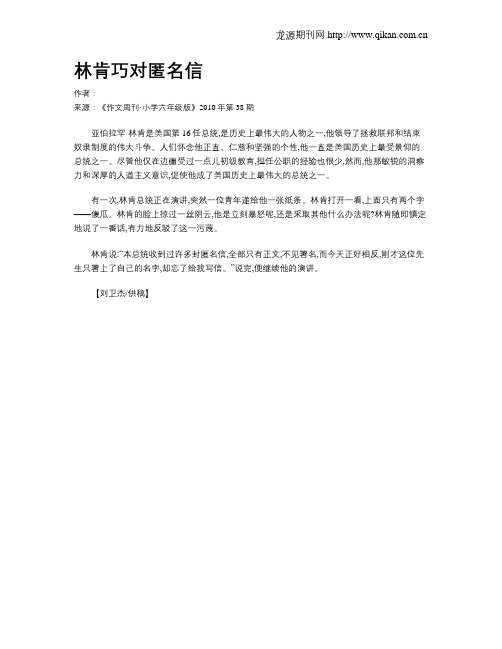
龙源期刊网
林肯巧对匿名信
作者:
来源:《作文周刊·小学六年级版》2010年第38期
亚伯拉罕·林肯是美国第16任总统,是历史上最伟大的人物之一,他领导了拯救联邦和结束奴隶制度的伟大斗争。
人们怀念他正直、仁慈和坚强的个性,他一直是美国历史上最受景仰的总统之一。
尽管他仅在边疆受过一点儿初级教育,担任公职的经验也很少,然而,他那敏锐的洞察力和深厚的人道主义意识,促使他成了美国历史上最伟大的总统之一。
有一次,林肯总统正在演讲,突然一位青年递给他一张纸条。
林肯打开一看,上面只有两个字——傻瓜。
林肯的脸上掠过一丝阴云,他是立刻暴怒呢,还是采取其他什么办法呢?林肯随即镇定地说了一番话,有力地反驳了这一污蔑。
林肯说:“本总统收到过许多封匿名信,全部只有正文,不见署名,而今天正好相反,刚才这位先生只署上了自己的名字,却忘了给我写信。
”说完,便继续他的演讲。
【刘卫杰/供稿】。
美国总统林肯的1863年感恩节宣言(中英文)

美国总统林肯的1863年感恩节宣言(中英文)美国总统林肯的1863年感恩节宣言(中英文)建立依靠全能上帝之心和谦卑痛悔之灵是每个国家和个人当尽的责任;他们当存着这样一个坚定的盼望:真诚的忏悔将带来怜悯和宽恕;他们当认识圣经里所宣告的,并被历史所证实的一个至高真理,那就是:尊崇上帝的国家必蒙祝福。
我们都知道按着这位至高者神圣的律法,不管是国家还是个人,我们都本应当受到惩罚和整治。
难道我们不相信这场使土地荒凉、性命失丧的内战之灾是对我们放肆之罪的惩罚吗?作为一个国家、一个民族,我们当悔改在上帝面前。
我们曾经接受过来自天上的丰盛祝福;我们享受了多年的和平和昌盛;我们在人数、财富和国力上的增长都是其他任何的国家所无法相比的。
然而,我们却忘记了上帝。
我们忘记了那曾保守我们和平,那使我们人数加增,又赐予我们财富与力量的恩手,我们被心中的虚假所欺骗,以为所有的这些祝福都来自于我们自己超人的智慧和美德。
我们如此陶醉于不断的成功,沉迷于自我满足,以致不再向那创造我们的上帝祷告。
我认为我们应该做的是:全地美国人民当以庄严、恭敬和感恩的心,同声合一地承认上帝的作为。
因此,我恳请全美各地的每一为公民,包括那些旅居海外的美国人,把十一月的最后一个星期四作为"感恩节"来庆祝,赞美我们那居在天上的仁慈之父。
亚伯拉罕林肯总统Lincoln's 1863Thanksgiving ProclamationLincoln's Thanksgiving Proclamation that follows is taken from the collection ofLincoln 's papers in the Library of America series, Vol II, pp. 520-521.The yearthat is drawing towards its close, has been filled with the blessings offruitful fields and healthful skies. To these bounties, which are so constantlyenjoyed that we are prone to forget the source from which they come, othershave been added, which are of so extraordinary a nature, that they cannot failto penetrate and soften even the heart which is habitually insensible to theever watchful providence of Almighty God.. In the midst of a civil war ofunequalled magnitude and severity, which has sometimes seemed to foreign Statesto invite and to provoke their aggression, peace has been preserved with allnations, order has been maintained, the laws have been respected and obeyed,and harmony has prevailed everywhere except in the theatre of military conflict;while that theatre has been greatly contracted bythe advancing armies andnavies of the Union. Needful diversions of wealth and of strength from thefields of peaceful industry to the national defense, have not arrested theplough, the shuttle, or the ship; the axe had enlarged the borders of oursettlements, and the mines, as well of iron and coal as of the precious metals,have yielded even more abundantly than heretofore. Population has steadilyincreased, notwithstanding the waste that has been made in the camp, the siegeand the battle-field; and the country, rejoicing in the consciousness ofaugmented strength and vigor, is permitted to expect continuance of years withlarge increase of freedom.Nohuman counsel hath devised nor hath any mortal hand worked out these greatthings. They are the gracious gifts of the Most High God, who, while dealingwith us in anger for our sins, hath nevertheless remembered mercy. It hasseemed to me fit and proper that they should be solemnly, reverently and gratefullyacknowledged as with one heart and voice by the whole American People. I dotherefore invite my fellow citizens in every part of the United States , andalso those who are at sea and those who are sojourning in foreign lands, to setapart and observe the last Thursday of November next, as a day of ThanksgivingandPraise to our beneficent Father who dwelleth in the Heavens. And Irecommend to them that while offering up the ascriptions justly due to Him forsuch singular deliverances and blessings, they do also, with humble penitencefor our national perverseness and disobedience, commend to his tender care allthose who have become widows, orphans, mourners or sufferers in the lamentablecivil strife in which we are unavoidably engaged, and fervently implore theinterposition of the Almighty Hand to heal the wounds of the nation and torestore it as soon as may be consistent with the Divine purposes to the fullenjoyment of peace, harmony, tranquility and Union.Abraham Lincoln-----。
与林肯总统有关的励志小故事:不要赶走你的“马蝇”
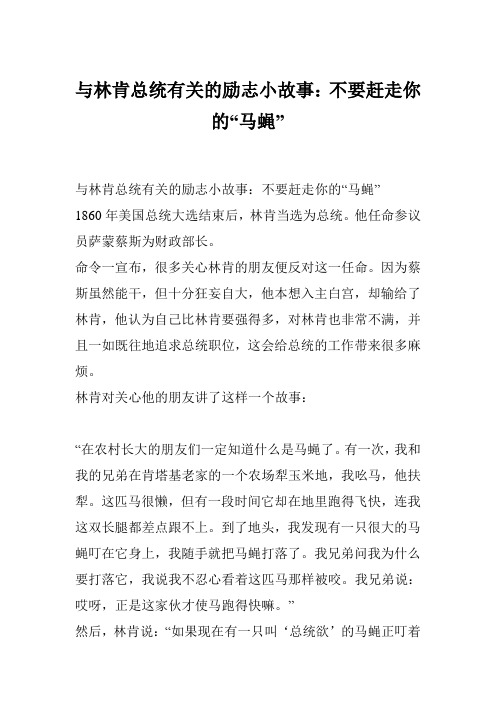
与林肯总统有关的励志小故事:不要赶走你
的“马蝇”
与林肯总统有关的励志小故事:不要赶走你的“马蝇”
1860年美国总统大选结束后,林肯当选为总统。
他任命参议员萨蒙蔡斯为财政部长。
命令一宣布,很多关心林肯的朋友便反对这一任命。
因为蔡斯虽然能干,但十分狂妄自大,他本想入主白宫,却输给了林肯,他认为自己比林肯要强得多,对林肯也非常不满,并且一如既往地追求总统职位,这会给总统的工作带来很多麻烦。
林肯对关心他的朋友讲了这样一个故事:
“在农村长大的朋友们一定知道什么是马蝇了。
有一次,我和我的兄弟在肯塔基老家的一个农场犁玉米地,我吆马,他扶犁。
这匹马很懒,但有一段时间它却在地里跑得飞快,连我这双长腿都差点跟不上。
到了地头,我发现有一只很大的马蝇叮在它身上,我随手就把马蝇打落了。
我兄弟问我为什么要打落它,我说我不忍心看着这匹马那样被咬。
我兄弟说:哎呀,正是这家伙才使马跑得快嘛。
”
然后,林肯说:“如果现在有一只叫‘总统欲’的马蝇正叮着
蔡斯先生,那么只要它能使蔡斯和那个赶马人不停地跑,我就不想去打落它。
”
【感悟】
其实,蔡斯对于林肯而言,也是一只“马蝇”。
用好这样的“马蝇”,会给自己意想不到的激励效果。
没有对手的英雄是孤独的,没有敌人的将军也是慵懒而颓废的,不会有任何发展的。
美国总统林肯的演讲稿
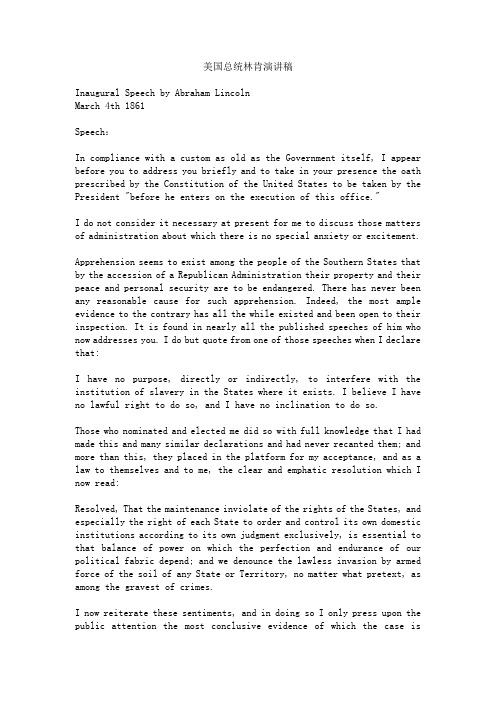
美国总统林肯演讲稿Inaugural Speech by Abraham LincolnMarch 4th 1861Speech:In compliance with a custom as old as the Government itself, I appear before you to address you briefly and to take in your presence the oath prescribed by the Constitution of the United States to be taken by the President "before he enters on the execution of this office."I do not consider it necessary at present for me to discuss those matters of administration about which there is no special anxiety or excitement.Apprehension seems to exist among the people of the Southern States that by the accession of a Republican Administration their property and their peace and personal security are to be endangered. There has never been any reasonable cause for such apprehension. Indeed, the most ample evidence to the contrary has all the while existed and been open to their inspection. It is found in nearly all the published speeches of him who now addresses you. I do but quote from one of those speeches when I declare that:I have no purpose, directly or indirectly, to interfere with the institution of slavery in the States where it exists. I believe I have no lawful right to do so, and I have no inclination to do so.Those who nominated and elected me did so with full knowledge that I had made this and many similar declarations and had never recanted them; and more than this, they placed in the platform for my acceptance, and as a law to themselves and to me, the clear and emphatic resolution which I now read:Resolved, That the maintenance inviolate of the rights of the States, and especially the right of each State to order and control its own domestic institutions according to its own judgment exclusively, is essential to that balance of power on which the perfection and endurance of our political fabric depend; and we denounce the lawless invasion by armed force of the soil of any State or Territory, no matter what pretext, as among the gravest of crimes.I now reiterate these sentiments, and in doing so I only press upon the public attention the most conclusive evidence of which the case issusceptible that the property, peace, and security of no section are to be in any wise endangered by the now incoming Administration. I add, too, that all the protection which, consistently with the Constitution and the laws, can be given will be cheerfully given to all the States when lawfully demanded, for whatever cause - as cheerfully to one section as to another.There is much controversy about the delivering up of fugitives from service or labour. The clause I now read is as plainly written in the Constitution as any other of its provisions:No person held to service or labour in one State, under the laws thereof, escaping into another, shall in consequence of any law or regulation therein be discharged from such service or labour, but shall be delivered up on claim of the party to whom such service or labour may be due.It is scarcely questioned that this provision was intended by those who made it for the reclaiming of what we call fugitive slaves; and the intention of the lawgiver is the law. All members of Congress swear their support to the whole Constitution - to this provision as much as to any other. To the proposition, then, that slaves whose cases come within the terms of this clause "shall be delivered up" their oaths are unanimous. Now, if they would make the effort in good temper, could they not with nearly equal unanimity frame and pass a law by means of which to keep good that unanimous oath?There is some difference of opinion whether this clause should be enforced by national or by State authority, but surely that difference is not a very material one. If the slave is to be surrendered, it can be of but little consequence to him or to others by which authority it is done. And should anyone in any case be content that his oath shall go un-kept on a merely unsubstantial controversy as to how it shall be kept?Again: In any law upon this subject ought not all the safeguards of liberty known in civilized and humane jurisprudence to be introduced, so that a free man be not in any case surrendered as a slave? And might it not be well at the same time to provide by law for the enforcement of that clause in the Constitution which guarantees that "the citizens of each State shall be entitled to all privileges and immunities of citizens in the several States"?I take the official oath to-day with no mental reservations and with no purpose to construe the Constitution or laws by any hypercritical rules; and while I do not choose now to specify particular acts of Congress as proper to be enforced, I do suggest that it will be much safer for all,both in official and private stations, to conform to and abide by all those acts which stand un-repealed than to violate any of them trusting to find impunity in having them held to be unconstitutional.It is seventy-two years since the first inauguration of a President under our National Constitution. During that period fifteen different and greatly distinguished citizens have in succession administered the executive branch of the Government. They have conducted it through many perils, and generally with great success. Yet, with all this scope of precedent, I now enter upon the same task for the brief constitutional term of four years under great and peculiar difficulty. A disruption of the Federal Union, heretofore only menaced, is now formidably attempted. TopI hold that in contemplation of universal law and of the Constitution the Union of these States is perpetual. Perpetuity is implied, if not expressed, in the fundamental law of all national governments. It is safe to assert that no government proper ever had a provision in its organic law for its own termination. Continue to execute all the express provisions of our National Constitution, and the Union will endure forever, it being impossible to destroy it except by some action not provided for in the instrument itself.Again: If the United States be not a government proper, but an association of States in the nature of contract merely, can it, as a contract, be peaceably unmade by less than all the parties who made it? One party to a contract may violate it - break it, so to speak - but does it not require all to lawfully rescind it?Descending from these general principles, we find the proposition that in legal contemplation the Union is perpetual confirmed by the history of the Union itself. The Union is much older than the Constitution. It was formed, in fact, by the Articles of Association in 1774. It was matured and continued by the Declaration of Independence in 1776. It was further matured, and the faith of all the then thirteen States expressly plighted and engaged that it should be perpetual, by the Articles of Confederation in 1778. And finally, in 1787, one of the declared objects for ordaining and establishing the Constitution was "to form a more perfect Union."But if destruction of the Union by one or by a part only of the States be lawfully possible, the Union is less perfect than before the Constitution, having lost the vital element of perpetuity.It follows from these views that no State upon its own mere motion canlawfully get out of the Union; that resolves and ordinances to that effect are legally void, and that acts of violence within any State or States against the authority of the United States are insurrectionary or revolutionary, according to circumstances.I therefore consider that in view of the Constitution and the laws the Union is unbroken, and to the extent of my ability, I shall take care, as the Constitution itself expressly enjoins upon me, that the laws of the Union be faithfully executed in all the States. Doing this I deem to be only a simple duty on my part, and I shall perform it so far as practicable unless my rightful masters, the American people, shall withhold the requisite means or in some authoritative manner direct the contrary. I trust this will not be regarded as a menace, but only as the declared purpose of the Union that it will constitutionally defend and maintain itself.In doing this there needs to be no bloodshed or violence, and there shall be none unless it be forced upon the national authority. The power confided to me will be used to hold, occupy, and possess the property and places belonging to the Government and to collect the duties and imposts; but beyond what may be necessary for these objects, there will be no invasion, no using of force against or among the people anywhere. Where hostility to the United States in any interior locality shall be so great and universal as to prevent competent resident citizens from holding the Federal offices, there will be no attempt to force obnoxious strangers among the people for that object. While the strict legal right may exist in the Government to enforce the exercise of these offices, the attempt to do so would be so irritating and so nearly impracticable withal that I deem it better to forego for the time the uses of such offices. TopThe mails, unless repelled, will continue to be furnished in all parts of the Union. So far as possible the people everywhere shall have that sense of perfect security which is most favourable to calm thought and reflection. The course here indicated will be followed unless current events and experience shall show a modification or change to be proper, and in every case and exigency my best discretion will be exercised, according to circumstances actually existing and with a view and a hope of a peaceful solution of the national troubles and the restoration of fraternal sympathies and affections.That there are persons in one section or another who seek to destroy the Union at all events and are glad of any pretext to do it I will neither affirm nor deny; but if there be such, I need address no word to them.To those, however, who really love the Union may I not speak?Before entering upon so grave a matter as the destruction of our national fabric, with all its benefits, its memories, and its hopes, would it not be wise to ascertain precisely why we do it? Will you hazard so desperate a step while there is any possibility that any portion of the ills you fly from have no real existence? Will you, while the certain ills you fly to are greater than all the real ones you fly from, will you risk the commission of so fearful a mistake?All profess to be content in the Union if all constitutional rights can be maintained. Is it true, then, that any right plainly written in the Constitution has been denied? I think not. Happily, the human mind is so constituted that no party can reach to the audacity of doing this. Think, if you can, of a single instance in which a plainly written provision of the Constitution has ever been denied. If by the mere force of numbers a majority should deprive a minority of any clearly written constitutional right, it might in a moral point of view justify revolution; certainly would if such right were a vital one. But such is not our case. All the vital rights of minorities and of individuals are so plainly assured to them by affirmations and negations, guaranties and prohibitions, in the Constitution that controversies never arise concerning them. But no organic law can ever be framed with a provision specifically applicable to every question which may occur in practical administration. No foresight can anticipate nor any document of reasonable length contain express provisions for all possible questions. Shall fugitives from labor be surrendered by national or by State authority? The Constitution does not expressly say. May Congress prohibit slavery in the Territories? The Constitution does not expressly say. Must Congress protect slavery in the Territories? The Constitution does not expressly say.。
林肯竞选总统时的演讲稿
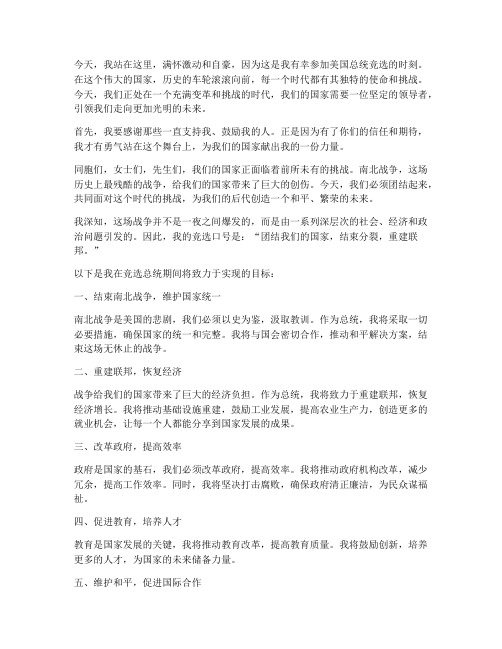
今天,我站在这里,满怀激动和自豪,因为这是我有幸参加美国总统竞选的时刻。
在这个伟大的国家,历史的车轮滚滚向前,每一个时代都有其独特的使命和挑战。
今天,我们正处在一个充满变革和挑战的时代,我们的国家需要一位坚定的领导者,引领我们走向更加光明的未来。
首先,我要感谢那些一直支持我、鼓励我的人。
正是因为有了你们的信任和期待,我才有勇气站在这个舞台上,为我们的国家献出我的一份力量。
同胞们,女士们,先生们,我们的国家正面临着前所未有的挑战。
南北战争,这场历史上最残酷的战争,给我们的国家带来了巨大的创伤。
今天,我们必须团结起来,共同面对这个时代的挑战,为我们的后代创造一个和平、繁荣的未来。
我深知,这场战争并不是一夜之间爆发的,而是由一系列深层次的社会、经济和政治问题引发的。
因此,我的竞选口号是:“团结我们的国家,结束分裂,重建联邦。
”以下是我在竞选总统期间将致力于实现的目标:一、结束南北战争,维护国家统一南北战争是美国的悲剧,我们必须以史为鉴,汲取教训。
作为总统,我将采取一切必要措施,确保国家的统一和完整。
我将与国会密切合作,推动和平解决方案,结束这场无休止的战争。
二、重建联邦,恢复经济战争给我们的国家带来了巨大的经济负担。
作为总统,我将致力于重建联邦,恢复经济增长。
我将推动基础设施重建,鼓励工业发展,提高农业生产力,创造更多的就业机会,让每一个人都能分享到国家发展的成果。
三、改革政府,提高效率政府是国家的基石,我们必须改革政府,提高效率。
我将推动政府机构改革,减少冗余,提高工作效率。
同时,我将坚决打击腐败,确保政府清正廉洁,为民众谋福祉。
四、促进教育,培养人才教育是国家发展的关键,我将推动教育改革,提高教育质量。
我将鼓励创新,培养更多的人才,为国家的未来储备力量。
五、维护和平,促进国际合作作为总统,我将致力于维护世界和平,促进国际合作。
我将与其他国家领导人保持密切沟通,共同应对全球性挑战,如气候变化、恐怖主义等。
成功的阅读与答案

成功的阅读与答案成功的阅读与答案「篇一」1864年,美国南北战争结束,一位叫马维尔的林肯。
记者:据我所知上两届总统都曾想过废除黑奴制,解放黑奴宣言也早在他们那个时期就已草就,可是他们都没拿起笔签署它。
请问总统先生,他们是不是想把这一些伟业留下来,让您去成就英名?林肯:可能有这意思吧。
不过,如果他们知道拿起笔需要的仅是一点勇气,我想他们一定非常懊丧。
这段话发生在林肯去帕特森的时候,马维尔还没来得及问下去,林肯的马车就出发了。
因此,他一直都没弄明白林肯的这句话到底是什么意思。
直到1914年,林肯去世50年后,马维尔才在林肯致朋友的一封信中找到答案。
在信里,林肯谈到幼年的一段经历:“我父亲在西雅图有一处农场,地里有许多石头。
正因为如此,父亲才得以较低价格买下它,有一天,母亲建议把上面的石头搬走。
父亲说如果可以搬走的话,主人就不会卖给我们了,它们是一座座小山头,都与大山连着。
”“有一年,父亲去城里买马,母亲带我们在农场劳动。
母亲说:‘让我们把这些碍事的东西搬走,好吗?’于是,我们开始挖那一块块石头,不长时间,就把它们弄走了,因为它们并不是父亲想象中的山头,而是一块块孤零零的石块,只要往下挖一英尺,就可以把它们晃动。
”林肯在信的末尾说,有些事情一些人之所以不去做,只是他们认为不可能。
有许多不可能,只存在于人的想象之中。
读到这封信的'时候,马维尔已是76岁的老人了,就是在这一年,他正式下决心学外语。
据说,1922年,他在广州采访时,是以流利的汉语和孙中山对话的。
1.给下列加粗字选正确的读音,打“√”。
结束(sùshù)总统(zǒngzhǒng)懊丧(sāngsàng)晃动(huànghuǎng)2.写出近义词。
懊丧——明白——3.76岁的马维尔学外语成功了吗?你从哪里看出来的?在文中画上“__”。
______________________________4.本文告诉我们的一个道理是A.做任何事只要有勇气就足够了。
美国总统林肯的小故事10则(2)

美国总统林肯的小故事10则(2)在林肯当律师时,有一次,他得悉朋友的儿子小阿姆斯特朗被控为谋财害命,已初步判定有罪。
他以被告律师的资格,到法院查阅了全部案卷。
知道全案的关键在于原告方面的一位证人福尔逊,因为他发誓说在10月18日的月光下,清楚地目击小阿姆斯特朗用枪击毙了死者。
对此,林肯要求复审。
在这场精彩的复审中,有以下一段对话。
林肯问证人:你发誓说看清了小阿姆斯特朗? 福尔逊:是的。
林肯:你在草堆后,小阿姆斯特朗在大树下,两处相距二三十米,能认清吗? 福尔逊:看得很清楚,因为月光很亮。
林肯:你肯定不是从衣着方面看清他的吗? 福尔逊:不是的,我肯定看清了他的脸,因为月光照亮了他的脸。
林肯:你能肯定时间是在11时吗? 福尔逊:充分肯定,因为我回屋看了钟,那时是11时15分。
林肯问到达里,就转过身来,发表了一席惊人的谈话:“我不能不告诉大家,这个证人是一个彻头彻尾的骗子。
他一口咬定10月18日晚上11时在月光下看清了被告的脸。
请大家想想,10月18日那天是上弦月,晚上11时月亮已经下山,哪里还有月光?退一步说,也许他时间记得不十分精确,时间稍有提前。
但那时,月光是从西往东照,草堆在东,大树在西,如果被告的脸面对草堆,脸上是不可能有月光的!”大家先是一阵沉默,紧接着掌声、欢呼声一起进发出来。
福尔逊傻了眼。
一天,国防部长斯坦顿来到林肯跟前,气呼呼地对他诉说一位少将用侮辱的话指责他偏袒一些人。
林肯听了,建议他写封信针锋相对地反驳他,说:“你可以狠狠地刺痛他一下嘛。
”斯坦顿立即写了一封措词很强硬的信拿给总统看。
“对了,对了,”林肯完全赞成,大声喊道,“写得好!严厉地批评他一顿,这是个最好的办法,斯坦顿。
”但是当斯坦顿把信叠好快要放进信封时,林肯却又阻止说:“你打算怎样处置它?”“寄出去呀。
”斯坦顿被他这么一问倒弄得稀里糊涂,丈二和尚摸不着头脑。
“不要胡闹,”林肯大声说:“你不应把信寄出。
快把它扔进火炉中去吧。
- 1、下载文档前请自行甄别文档内容的完整性,平台不提供额外的编辑、内容补充、找答案等附加服务。
- 2、"仅部分预览"的文档,不可在线预览部分如存在完整性等问题,可反馈申请退款(可完整预览的文档不适用该条件!)。
- 3、如文档侵犯您的权益,请联系客服反馈,我们会尽快为您处理(人工客服工作时间:9:00-18:30)。
世界上最动人的书信
美国总统林肯写给其兄弟的一封信
我为什么不能借钱给你
亲爱的江斯顿:
你向我借80块钱,我觉得目前最好不要借给你。
好几次我帮助你之后,你都说“现在我们的生活可以好过了”,但是时隔不久,你又面临了同样的困境。
现在,只能说明你自己有问题。
是什么问题呢?我想知道。
你不是个懒汉,但多少有点游手好闲。
自从我上次看见你,我就怀疑你没有认真工作过一天。
你不太讨厌工作,但却不卖劲干活,唯一的原因是因为你觉得你并不能从中获益多少。
所有的问题都源于你那浪费时间的恶习。
改掉这种习惯对你来说很重要,而对你的儿女则更加重要。
这是因为他们的人生之路还很长,在没有养成闲散的习惯之前,尚可以加以制止。
这比养成之后再纠正要容易得多。
现在你需要些现钱,我建议你去工作,去找个出薪雇人的老板,为他“卖力地”工作。
让你爸爸和你的几个儿子去应付家里春播和秋种的事吧,你自己去做些最挣钱的工作,再用你的工资抵债。
为了使你的劳动获得好的酬金,我现在答应你,从今天到5月1号,只要你工作挣到一块钱或是偿还了一块钱的债,我就再给你一块钱。
这样的话,如果你每月挣10块钱,你可以从我这再得到10块钱,那么你一个月就能挣20块钱。
我不是说让你到圣卢一伙加利福尼亚州的铅矿、金矿去,而是让你在离家近的地方找个最挣钱的工作——就在柯尔斯县境内。
如果你现在愿意这样做,很快就能还清债务。
更好的是你会养成不再欠债的好习惯。
但是,如果我现在帮你还了债,明年你又会负债累累。
你说,你愿意用你在天堂的席位换来七八十块钱。
这么说你把你在天堂的席位看得太廉价了。
其实,照我说的去做,保证你工作四五个月就能挣到那七八十块钱。
你又说,如果我借钱给你,你愿意把田产抵押给我,若是你将来还不清债,那田产就归我所有——
胡说八道!假如你现在有田地都无法生存,将来没有田地又怎么存活呢?你一向对我很好,我现在也没有对你无情无义,相反,如果你肯采纳我的建议,你会发现,对你来说,这比8个80块钱还值!
挚爱你的哥哥亚·林肯
1848年12月24日
注:江斯顿是林肯继母的儿子,他来信向林肯借钱,林肯以此信回复了他。
